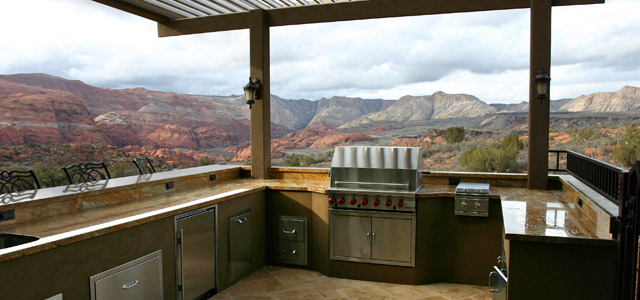Adding an outdoor kitchen to your home is not only an excellent way to enjoy the great outdoors, but it can also increase the value of your home. Regardless of if you want to entertain large groups of people, or just spend more time outside, adding an outdoor kitchen will not only increase your viable living space but also adds quite a bit of value to your home. Also, cooking is easier and usually much healthier when you do it outside.
When creating a plan for the construction of your outdoor kitchen, there are some items that are a “given.” For example, features such as teak patio furniture, a stone fire pit, and stainless steel barbecue grill are all “musts.” Also, if you implement items crafted from natural elements, such as wood and stone, it will complement the overall patio style and feeling of an outdoor kitchen. These items are also eco-friendly, which is an added bonus.
Another element you need to think carefully about when planning your outdoor kitchen is the countertop space. You should choose something that will offer plenty of room to prepare and serve your meals, while being able to stand up to extreme temperatures and harsh weather conditions. This is why it is smart to install granite countertops in your outdoor kitchen. Not only is granite eco-friendly, but it is also built to last.
Tips for Maintaining Outdoor Granite Counters
There is no question that installing granite countertops outside will look great; however, the question is, how can you keep them looking that way. While rain and sunshine will naturally wash away any food or stains from the surface, if it is absorbent, then you may need to take additional steps to prevent spills such as mustard or wine, since these products can leave behind permanent marks.
In most cases, a general cleaning will allow you to hose off your granite countertops and use a non-abrasive detergent to remove any surface dirt or dust that builds up from food spills, pollen, and other types of outdoor grime. An excellent way to reduce the buildup of gunk on outside counters is to ensure they are covered up when they are not being used. This is especially important if there is no awning or roof over the counters outside.
Snow, hail, rain, and the sun can all take their toll on your new counters. They are just like natural stone surfaces that will wear down as time passes from exposure to the various elements. By keeping them covered and investing in resurfacing from time to time will help go quite a long way to extending their longevity.
Not all Granite is Created Equal
From a geological standpoint, there are quite a few different types of stone that are sold as “granite.” This is why it is important to do a bit of research prior to making a purchase. Be sure to ask the person installing the countertop to see if you can test a sample of the slab you want to buy, which ensures it will not be excessively absorbent or react with liquids or foods that have acidic properties.
There are also certain types of granite countertops that will show wear and tear much faster than other types. This means that the shiny polish, which helps to bring out the beautiful, intense colors in the granite, could wear away.
If this occurs, there is no need to panic and think you will need a complete replacement. There are still some steps that can be taken to restore the granite countertops you are using for your outdoor kitchen or patio area. A professional will help you determine what needs to be done to restore the original appearance of the granite. Alternatively, choosing a honed finish might help to keep the finish lasting a very long time.
Handling the Summer Heat
While granite can hold up to extreme temperatures, it does not mean that it is smart to leave the countertops in an outside kitchen exposed to the sun. By the time mid-afternoon arrives on a hot summer day, the granite’s surface is going to be too hot to touch. You should consider installing some type of umbrella, awning, pergola or another kind of shade that will cover up as much of the counter as possible. This will make it much more comfortable for sitting or standing close to the counter, too.
During the winter months, it is a good idea to minimize the counter’s exposure to sleet and snow. This will help to prolong the granite’s useful life. Keep in mind, if you live in an area where the freeze and thaw process is present, then the expansion and contraction of a sink can put stress on the granite. Be sure to watch this for signs of an issue, and talk to your granite installer about if your outdoor kitchen is a good candidate for granite countertops.


